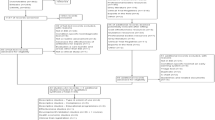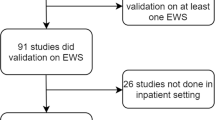Abstract
Aim
In 2013, a National Early Warning System (EWS) was implemented in Ireland. Whilst evidence exists to support the clinical effectiveness of EWS in the acute health care setting, there is a paucity of information on their cost and cost effectiveness. The objective of this systematic literature review was to critically evaluate the economic literature on the use of EWS in adult patients in acute health care settings for the timely detection of physiological deterioration.
Methods
A systematic literature review was conducted to accumulate the economic evidence on the use of EWS in adult patients in acute health care settings.
Results
The search yielded one health technology assessment, two budget impact analyses and two cost descriptions. Three of the studies were Irish, and considered the national EWS system. A Dutch study reported financial consequences of a single parameter EWS, as part of a rapid response system, in a surgical ward. The fifth study examined an advanced triage system in a medical emergency admission unit in Wales.
Conclusions
The economic evidence on the use of EWS amongst adult patients in acute health care settings for the timely detection of physiological deterioration is limited. Further research is required to investigate the cost effectiveness of EWS, and the appropriateness of using standard methods to do so. The recent implementation of a national EWS in Ireland offers a unique opportunity to bridge this gap in the literature to examine the costs and cost effectiveness of a nationally implemented EWS system.

Similar content being viewed by others
References
Lafond S (2015) Funding Overview. Current NHS Spending in England. The Health Foundation. January 2015. [cited 2017; Available from http://www.health.org.uk/sites/health/files/FundingOverview_CurrentNHSSpendingInEngland.pdf]
HSE (2014) Annual Report and Financial Statements 2014. Health Services Executive, Ireland
Hegarty J, Savage E, Andrews T, Walshe N, McCarthy B, Saab M, Drummond FJ, Forde M, Breen D, Henn P, Murphy A, Cronin J, Whelan R (2016) A systematic review of the clinical & economic literature and a budget impact analysis of any new guideline recommendations to inform the planned update of National Clinical Guideline No. 1—National Early Warning Score (NEWS) for the Irish health system. University College Cork, Ireland
Alam N, Hobbelink EL, Van Tienhoven AJ, Van De Ven PM, Jansma EP, Nanayakkara PWB (2014) The impact of the use of the Early Warning Score (EWS) on patient outcomes: a systematic review. Resuscitation 85:587–594
Bannard-Smith J, Abbas S, Ingleby S, Fullwood C, Jones S, Eddleston J (2015) Use of an electronic early warning score and mortality for patients admitted out of hours to a large teaching hospital. Crit Care 19:P408
NCEC (2013) National Clinical Guideline No. 1. National Early Warning Score. Department of Health, Ireland
DOH (2014) National Clinical Guidelines. [cited 2016; Available from: http://health.gov.ie/blog/policy/n/national-clinical-guidelines/
HSE (2013) National Early Warning Score NEWS. [cited 2016; Available from: http://www.hse.ie/eng/about/Who/ONMSD/Practicedevelopment/MEWS/.
Higgins JP, G.S. (2008) Cochrane handbook for systematic reviews of interventions. Wiley Online Libary, USA
HIQA (2014) Draft guidelines for the retrieval and interpretation of economic evaluations of health technologies in Ireland. Health Information and Quality Authority, Ireland
Davies KS (2011) Formulating the evidence based practice question: a review of the frameworks. Evidence Based Library and Information Practice 6(2):75–80
Drummond MF, J.T. (1996) Guidelines for authors and peer reviewers of economic submissions to the BMJ. BMJ 313(7052):275–283
Husereau D et al (2013) Consolidated health economic evaluation reporting standards (CHEERS) statement. Cost Effectiveness and Resource Allocation 11(1):1
CRD (2009) Systematic reviews: CRD’s guidance for undertaking reviews in health care. Centre for Reviews and Dissemination, York
HIQA (2015) Health technology assessment of the use of information technology for early warning and clinical handover systems. Health Information and Quality Authority, Ireland
NCEC (2014) Sepsis Management. National Clinical Guideline No.6. 2014, Department of Health, Ireland. [cited 2016; Available at http://health.gov.ie/wp-content/uploads/2015/05/Sepsis-Mgmt_Full-Report.pdf]
Simmes F et al (2014) Financial consequences of the implementation of a rapid response system on a surgical ward. J Eval Clin Pract 20(4):342–347
Subbe C et al (2014) A pragmatic triage system to reduce length of stay in medical emergency admission: feasibility study and health economic analysis. European journal of internal medicine 25(9):815–820
HIQA (2015) Health technology assessment of the use of information technology for early warning and clinical handover systems. Ireland, Health Information and Quality Authority
NCEC (2013) National Early Warning Score. Ireland, Department of Health
NCEC (2014) Sepsis management. Ireland, Department of Health
Jones S et al (2011) Bedside electronic capture of clinical observations and automated clinical alerts to improve compliance with an Early Warning Score protocol. Critical Care and Resuscitation Journal 13(2):83–88
Mitchell I et al (2010) A prospective controlled trial of the effect of a multi-faceted intervention on early recognition and intervention in deteriorating hospital patients. Resuscitation 81(6):658–666
Shorr AF et al (2007) Economic implications of an evidence-based sepsis protocol: can we improve outcomes and lower costs?*. Crit Care Med 35(5):1257–1262
Richards M (2013) Sepsis management as an NHS clinical priority. Briefing, UK Professor Sir Mike Richards
CRD (2014) Effectiveness matters. Impact of Early Warning Systems on patient outcomes. Centre for Reviews and Dissemination, University of York, UK
Ludkihuize J (2016) Personal Email Communication, Re: COMET Study with A. Murphy,. 7th January 2016
Acknowledgements
Funding for the systematic review was from Department of Health, Ireland.
Support from rest of the research team which conducted the systematic review to inform the update of NCEC 1 for the Irish health system was recognized. Including: Dr Tom Andrews, Ms. Nuala Walshe, Dr Bridie McCarthy, Mr. Mohamad Saab, Ms. Mary Forde, Dr Dorothy Breen, Dr Pat Henn, Prof. Jonathan Drennan.
Author information
Authors and Affiliations
Corresponding author
Ethics declarations
Funding
This study was funded by the Department of Health, Ireland.
Conflict of interest
The authors declare that they have no conflict of interests.
Ethical approval
This article does not contain any studies with human participants or animals performed by any of the authors.
Rights and permissions
About this article
Cite this article
Murphy, A., Cronin, J., Whelan, R. et al. Economics of Early Warning Scores for identifying clinical deterioration—a systematic review. Ir J Med Sci 187, 193–205 (2018). https://doi.org/10.1007/s11845-017-1631-y
Received:
Accepted:
Published:
Issue Date:
DOI: https://doi.org/10.1007/s11845-017-1631-y
Keywords
Profiles
- A. Murphy View author profile




